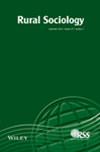Does Increasing Ethnic Diversity Challenge the Rural Idyll? An Analysis of Frames on Ethnic Diversity in Relation to Rurality in the Flemish Written Press (Belgium)*
IF 1.9
3区 社会学
Q2 SOCIOLOGY
引用次数: 0
Abstract
The social construction of rurality remains a collective fantasy of a safe, green, ethnically homogeneous environment. This fantasy, called “the rural idyll,” still dominates the way in which people give meaning to their lives, the lives of others, and the places where they live. This idyll is based on an interrelated urban/ethnic diverse versus rural/white dichotomy, even as rural areas are in fact becoming more ethnically diverse. The question of how ethnic diversity is understood, in traditional media, through the fantasy of the rural idyll is central to this paper. Drawing on recurring stories in 450 newspaper articles in the Flemish written press covering rural ethnic diversity, we identify four different ideal‐type frames: growing ethnic diversity as a (1) threat to the rural idyll, (2) confirmation of the rural idyll, (3) the consequence of rural deprivation, and (4) the solution to rural deprivation. Our analysis shows that a large proportion of the newspaper articles use “ethnic diversity as a threat to the rural idyll.” This connects with the long‐standing anti‐urban discourse in Flanders (Belgium). Nevertheless, the presence and emergence of other frames indicate that this discourse does not remain not unchallenged.民族多样性的增加是否挑战了田园牧歌?佛兰德文字出版中与乡村性相关的民族多样性框架分析(比利时)*
农村社会建设仍然是一种集体幻想,即一个安全、绿色、民族同质的环境。这种被称为“田园牧歌”的幻想,仍然主导着人们赋予自己、他人和他们所居住的地方的生活意义的方式。这种田园诗是基于城市/种族多样性与农村/白人的相互关联的二分法,即使农村地区实际上正变得越来越种族多样化。在传统媒体中,如何通过对田园牧歌的幻想来理解种族多样性的问题是本文的核心。根据佛兰德语450篇关于农村民族多样性的书面新闻报道中反复出现的故事,我们确定了四种不同的理想类型框架:日益增长的民族多样性是(1)对乡村田园的威胁,(2)对乡村田园的肯定,(3)农村剥夺的后果,(4)农村剥夺的解决方案。我们的分析表明,很大一部分报纸文章使用“种族多样性是对乡村田园的威胁”。这与佛兰德斯(比利时)长期以来的反城市话语有关。然而,其他框架的存在和出现表明,这一话语并非没有受到挑战。
本文章由计算机程序翻译,如有差异,请以英文原文为准。
求助全文
约1分钟内获得全文
求助全文
来源期刊

RURAL SOCIOLOGY
SOCIOLOGY-
CiteScore
4.60
自引率
13.00%
发文量
47
期刊介绍:
A forum for cutting-edge research, Rural Sociology explores sociological and interdisciplinary approaches to emerging social issues and new approaches to recurring social issues affecting rural people and places. The journal is particularly interested in advancing sociological theory and welcomes the use of a wide range of social science methodologies. Manuscripts that use a sociological perspective to address the effects of local and global systems on rural people and places, rural community revitalization, rural demographic changes, rural poverty, natural resource allocations, the environment, food and agricultural systems, and related topics from all regions of the world are welcome. Rural Sociology also accepts papers that significantly advance the measurement of key sociological concepts or provide well-documented critical analysis of one or more theories as these measures and analyses are related to rural sociology.
 求助内容:
求助内容: 应助结果提醒方式:
应助结果提醒方式:


